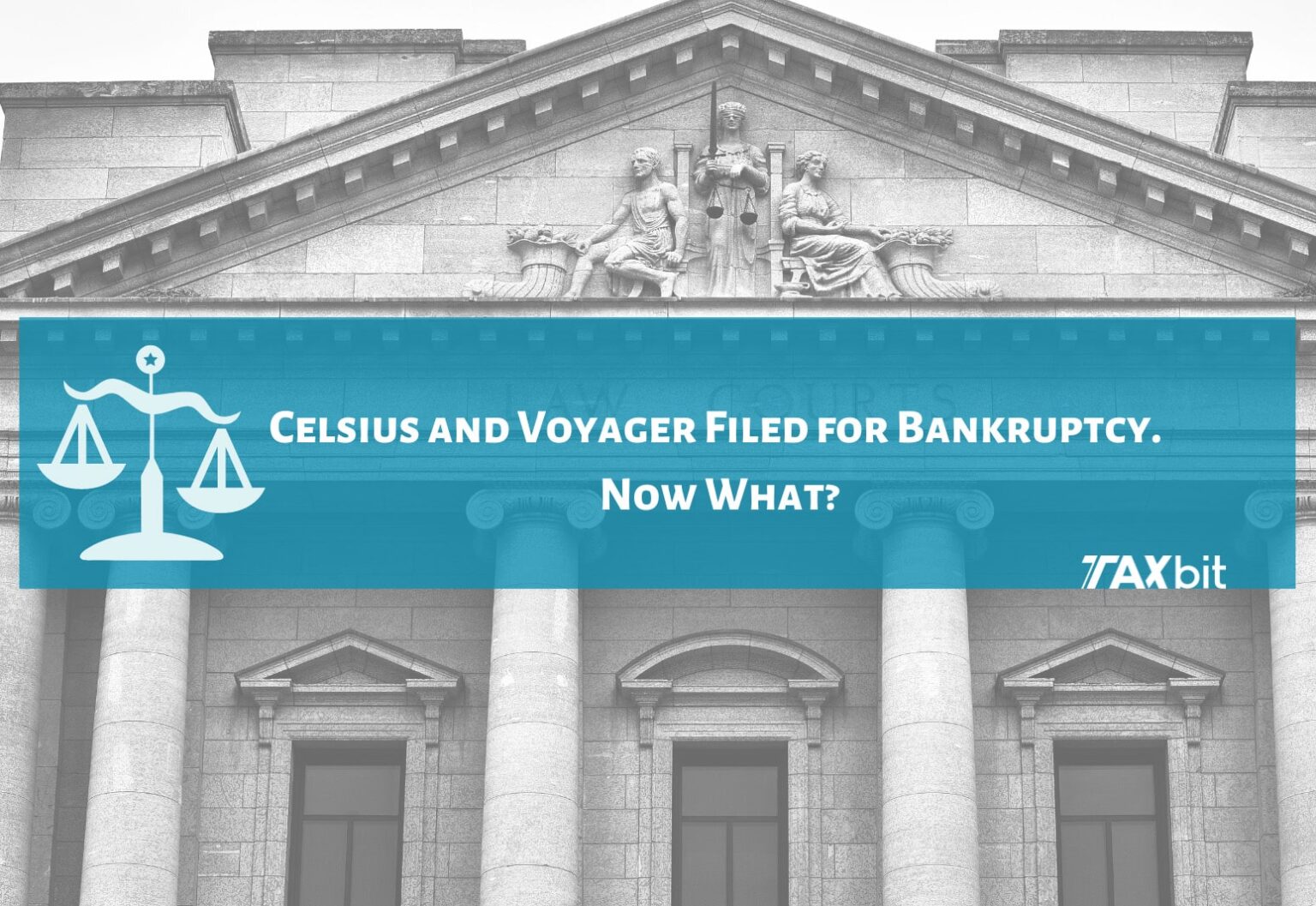- Celsius and Voyager have both filed for bankruptcy.
- On January 4th, the judge in the Celsius group of bankruptcies issued an order holding that digital assets deposited in Earn accounts were the property of the Debtors' Estates rather than property belonging to those customers/depositors
- This more recent news is rapidly developing but could have major implications for other bankruptcy estate proceedings
- Customers may receive compensation; however, it is unlikely to be equivalent in value to the crypto transferred to the platforms
- The tax code likely permits a deduction for losses suffered by customers
*Update on January 5th, 2023: Yesterday, the judge in the Celsius group of bankruptcies issued an order holding that digital assets deposited in Earn accounts were the property of the Debtors’ Estates rather than property belonging to those customers/depositors. I will not be surprised if the ruling is challenged as it has vast economic implications for those customers who are now unsecured creditors in the proceedings. With that said, the analysis seems sound – the terms of use agreement pretty clearly states that title to (ownership of) deposited assets transfers to Celsius. This ruling is likely to have some influence over similar issues that will arise in the FTX and BlockFi bankruptcy proceedings. Although the outcomes may vary. Aside from the bankruptcy and property law issues, the court’s order also may have unknowingly added insult to injury on the tax front for the impacted customers. There has long been uncertainty as to whether deposits or lending arrangements like Celsius’s Earn account result in any tax impact. The IRS has never issued any guidance and most have ignored it as non-taxable under the concept that no disposition of property occurred, which is typically the threshold requirement for a taxable event. The court’s ruling may change that. The deposit (or lending) of digital assets through Earn accounts has now been adjudicated as a transfer of property from the customer to Celsius–a disposition event. That disposition event likely has tax implications. For further information, the Taxbit team has developed a deeper dive post on the matter here.
One month after announcing it was pausing all withdrawals, swaps, and transfers between accounts, Celsius and its affiliated companies filed for bankruptcy on July 13, 2022.
Celsius is following the path taken by Voyager, another crypto lending platform. Voyager suspended all trading, deposits, withdrawals, and rewards on July 1, 2022, then filed for bankruptcy on July 5, 2022.
How will the bankruptcy unfold?
And what does this mean for crypto account holders who partnered with the company? We’ll answer those questions, but first, let’s provide an overview of bankruptcy.
→ While the U.S. Bankruptcy Code permits businesses to file for bankruptcy when they cannot fulfill their financial obligations, this does not mean the organization has no money or assets.
→ Instead, bankruptcy simply places a hold on creditors, giving the organization time to restructure its debt or liquidate assets to pay off creditors.
→ Both Celsius and Voyager filed a Chapter 11 bankruptcy, which is directed at reorganizing the business so they can keep operating.
→ Unfortunately, bankruptcy outcomes are always uncertain. In most cases, creditors do receive a payout on outstanding claims. However, those payouts are generally not received in full.
Customers of Celsius and Voyager have questions. We’ll provide the best answers we can.
Am I going to get any of my crypto back?
The short answer? It’s too early to say. According to court filings, Celsius has:
→ Roughly $4.3 billion in assets
→ $5.5 billion in liabilities
→ $1.2 billion deficit, which includes obligations to crypto customers
Those liabilities include obligations to customers for the return of crypto that had been transferred to Celsius. Celsius’ customers are now its largest creditors. The same is true for Voyager.
Customers should expect to receive notifications about their rights as creditors. Those notifications should be reviewed and responded to diligently to maximize any opportunity for a payout.
What will my payout look like?
While customers may receive a payout from Celsius or Voyager, it may not be in the form of crypto or equivalent in value to the crypto transferred to the platforms. Why?
On both platforms, the terms and conditions governing customers’ accounts state that any crypto sent to the platform results in the customer transferring the complete right and title of that crypto to the platform. Although characterized as a loan, the legal terms actually indicate that a customer transferred crypto to the platform in exchange for an agreement.
What’s the agreement? That the platforms would return identical crypto units in the future and pay an interim financing fee. Now that Celsius and Voyager have entered bankruptcy, customers hold that agreement as a claim against them. While that claim has value, it is important to note that it relates to property rather than money.
That is a subtle but important distinction in terms of taxes.
What are the tax implications for customers?
Unfortunately, it depends.
Ultimately, tax implications will vary for each customer. We realize this isn’t a definitive answer, but it’s an impossible question to answer as every customer’s financial and tax situation is unique.
Impacted customers should speak with a tax professional once they have all of the necessary information.
Can I deduct the value of my crypto as a bad debt?
Probably not—and here’s why: Although the tax code permits a deduction for bad debts, underlying regulations define a debt as arising from a “valid and enforceable obligation to pay a fixed or determinable sum of money.”
Allow us to translate: Here, a debt doesn’t exist. Why? Because crypto, not money, was transferred to the platform. The outcome would be different if USD was involved.
Can’t I deduct the loss?
Almost certainly. The trouble is we don’t know when or how much yet. The tax code has a provision allowing a deduction for losses incurred that are not covered by insurance or other means.
There are five loss categories, but most Celsius and Voyager customers will likely fit into the category of: “Losses incurred in a transaction entered into for profit (but not part of a trade or business).” Note that a loss is not deductible until a transaction is considered closed and completed.
When will I be able to deduct my loss?
That’s unclear because the loss is only deductible once there is no longer a reasonable expectation of recovery. Thus, customers need to see how the bankruptcy progresses.
How will the bankruptcy unfold?
To start, Celsius will submit a plan of reorganization. Under the bankruptcy code, a Chapter 11 debtor generally has 120 days to submit a proposed plan. That doesn’t mean it can’t happen sooner, though.
After that, the creditors will review the plan, vote, and approve or disapprove it before final acceptance by the court.
This is a long way of saying Celsius customers should expect some answers in the next 120 days.
While we can only wait on Celsius’ proceedings, we can gain some insight from Voyager’s. After filing for bankruptcy, Voyager quickly submitted a reorganization plan. While Voyager customers are still in a holding pattern, we know Voyager’s proposed reorganization plan states that account holders will receive a pro-rata share of:
- Crypto back from the platform
- Common stock in the reorganized Voyager
- Existing Voyager tokens
- Any recovery made on Voyager’s loan to Three Arrows Capital of BTC and USDC
Compensation is coming. However, dollar amounts remain a mystery.
How much can I deduct?
The bankruptcy proceedings will determine your deduction amount, but the math is pretty simple.
The deduction amount is equal to the acquisition cost basis for the lost property minus the value of any compensation received for the loss. Let’s translate that with some numbers:
- $5,000 (cost basis of lost property)
- $2,000 (amount recovered in the bankruptcy case)
- $3,000 (loss deductible)
For Celsius customers, recovery amounts, if any, will be determined in the bankruptcy plan. Once that plan is in place, creditors will be assigned a payment class and paid according to their rank.
To calculate the deduction, determine the cost basis of the lost asset. Identifying the cost basis of particular crypto units has always been tricky, but the cost basis question may be even trickier here. Why?
The IRS has not provided any guidance on the appropriate tax treatment for these types of crypto lending arrangements. There are two possible tax treatments that result in different cost bases.
Scenario One: Non-Taxable Event
If the original transfer of crypto to the platform (in return for the agreement by the platform to return equivalent units in the future) is treated as a non-taxable event, then the acquisition cost basis of the transferred crypto is likely used as the cost basis of the agreement.
In this case, you would subtract the value of any recovery received in the bankruptcy from the cost basis of the transferred crypto.
Scenario Two: Taxable Event
If the original transfer of crypto to the platform is treated as a taxable event, then the value of the crypto at the time it was transferred becomes the cost basis in the agreement, which is likely larger. Of course, this also means you should have reported a gain or loss when transferring units to the platform.
Because there is a lack of guidance, it is not clear whether the original transfer of crypto to the platform is or is not a taxable event, but treating it as taxable seems more consistent with the tax code and general tax principles. Why?
Under the tax code, where property ownership is completely transferred away, even if it’s in exchange for an agreement to get equivalent property back in the future, that transfer is generally considered a taxable disposition of the property.
Under the legal terms for these platforms, transfers of crypto involved the complete surrender of ownership rights to the platform. Under either scenario, once you know the cost basis amount, you can calculate the loss.
But what kind of loss do I deduct?
This may be one of the trickiest questions to answer.
For tax purposes, crypto is considered property. As such, losses are typically capital losses. This means losses must first be applied against any capital gain. Losses exceeding capital gain are limited to $3,000 annually, with the excess being carried forward.
In situations like this, losses are generally characterized as ordinary, so they are not limited to $3,000. However, there is one exception: If the loss relates to the sale or exchange of property, then they are treated as capital losses. The current situation is novel, and the IRS could argue the loss is capital, but that is unlikely.
So what does all this mean for Celsius and Voyager customers? You will likely get to claim a tax deduction that is an ordinary loss.
For now, you are in a holding pattern. Although it does appear that both platforms are trying to maintain operations, how it unfolds remains to be seen. As the bankruptcy proceedings progress, customers will learn more about what their loss deduction will be.
.png)


